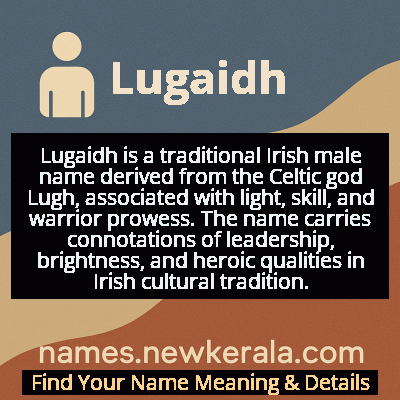Lugaidh Name Meaning & Details
Origin, Popularity, Numerology Analysis & Name Meaning of Lugaidh
Discover the origin, meaning, and cultural significance of the name LUGAIDH. Delve into its historical roots and explore the lasting impact it has had on communities and traditions.
Name
Lugaidh
Gender
Male
Origin
Irish
Lucky Number
8
Meaning of the Name - Lugaidh
Lugaidh is a traditional Irish male name derived from the Celtic god Lugh, associated with light, skill, and warrior prowess. The name carries connotations of leadership, brightness, and heroic qualities in Irish cultural tradition.
Lugaidh - Complete Numerology Analysis
Your Numerology Number
Based on Pythagorean Numerology System
Ruling Planet
Saturn
Positive Nature
Ambitious, efficient, realistic, and authoritative.
Negative Traits
Materialistic, stressed, confrontational, and can be overly ambitious.
Lucky Colours
Dark blue, black.
Lucky Days
Saturday.
Lucky Stones
Blue sapphire, amethyst.
Harmony Numbers
2, 4, 6.
Best Suited Professions
Business leaders, managers, financial services, law enforcement.
What People Like About You
Leadership, determination, organizational skills.
Famous People Named Lugaidh
Lugaidh Mac Con
Legendary High King of Ireland
Ruled Ireland for 30 years according to medieval texts, known for his military campaigns and justice
Lugaidh Lágha
Warrior hero
Prominent warrior in Irish mythology who fought alongside Cú Chulainn in epic battles
Lugaidh Riab nDerg
Mythological king
Known as 'Lugaidh of the Red Stripes' who became High King after passing divine tests of kingship
Lugaidh Mac Casrubae
Historical warrior chief
Recorded in annals as a powerful regional ruler who defended his territory against invading forces
Name Variations & International Equivalents
Click on blue names to explore their detailed meanings. Gray names with will be available soon.
Cultural & Historical Significance
The various Lugaidhs in Irish tradition often served as archetypal figures representing ideal kingship, military leadership, and the connection between mortal rulers and divine authority. This name appears so frequently in early Irish genealogies that scholars sometimes refer to 'the Lugaidhs' as a distinct class of heroic figures in Celtic tradition, embodying the warrior-king ideal that was central to early Irish concepts of leadership and social organization. The persistence of this name across centuries of Irish storytelling demonstrates its deep cultural resonance and the enduring appeal of the heroic values it represents.
Extended Personality Analysis
Individuals named Lugaidh are typically perceived as possessing strong leadership qualities, courage, and strategic thinking. Drawing from the name's mythological associations, they often exhibit natural authority and the ability to inspire others, combined with practical wisdom in challenging situations. There's an expectation of resilience and determination—characteristics inherited from the legendary warriors who first bore this name. They tend to be protective of their communities and principles, showing loyalty to those they consider under their care.
The name also suggests a creative or craft-oriented intelligence, reflecting Lugh's status as master of all arts. This combination of warrior spirit and intellectual capability makes the Lugaidh personality complex—both action-oriented and thoughtful, capable of both decisive combat and careful planning. Their strength is often tempered with a sense of justice and fairness, making them natural mediators and leaders rather than mere aggressors. The traditional association with multiple legendary figures bearing this name creates an expectation of versatility and the ability to excel in various domains, from battlefields to courts of law.
Modern Usage & Popularity
In contemporary times, Lugaidh remains a distinctly Irish name that has seen a revival through the Celtic cultural resurgence. While not among the most popular names in Ireland today, it maintains a presence particularly in Irish-speaking communities and among families seeking to honor their Gaelic heritage. The name is more commonly found in its anglicized forms like Lewis or Louis in English-speaking countries, but the original Irish spelling has gained traction among those interested in traditional Celtic names. Its usage is often intentional rather than casual, chosen by parents who value Irish cultural identity and mythological heritage. The name appears occasionally in birth registrations in Ireland and among the Irish diaspora, particularly in communities with strong cultural preservation efforts, though it remains relatively rare compared to more mainstream Irish names.
Symbolic & Spiritual Meanings
Symbolically, Lugaidh represents the union of martial prowess and enlightened leadership. The name carries connotations of light overcoming darkness, drawing from its connection to the god Lugh who brought skill and civilization. It symbolizes the ideal balance between strength and wisdom—the warrior who fights not merely for conquest but for justice and protection. The name also embodies the concept of sovereignty in Celtic tradition, where the rightful ruler maintains harmony between the people and the land. As a symbolic representation, Lugaidh suggests someone who illuminates the path for others, provides protection through strength of arms and character, and maintains order through principled action. The enduring presence of this name across centuries of Irish literature makes it a symbol of cultural continuity and the preservation of heroic ideals that transcend their original historical context.

